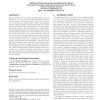Free Online Productivity Tools
i2Speak
i2Symbol
i2OCR
iTex2Img
iWeb2Print
iWeb2Shot
i2Type
iPdf2Split
iPdf2Merge
i2Bopomofo
i2Arabic
i2Style
i2Image
i2PDF
iLatex2Rtf
Sci2ools
113
Voted
GECCO
2009
Springer
2009
Springer
Analyzing the landscape of a graph based hyper-heuristic for timetabling problems
Hyper-heuristics can be thought of as “heuristics to choose heuristics”. They are concerned with adaptively finding solution methods, rather than directly producing a solution for the particular problem at hand. Hence, an important feature of hyper-heuristics is that they operate on a search space of heuristics rather than directly on a search space of problem solutions. A motivating aim is to build systems which are fundamentally more generic than is possible today. Understanding the structure of these heuristic search spaces is therefore, a research direction worth exploring. In this paper, we use the notion of fitness landscapes in the context of constructive hyper-heuristics. We conduct a landscape analysis on a heuristic search space conformed by sequences of graph coloring heuristics for timetabling. Our study reveals that these landscapes have a high level of neutrality and positional bias. Furthermore, although rugged, they have the encouraging feature of a globally conv...
| Added | 26 May 2010 |
| Updated | 26 May 2010 |
| Type | Conference |
| Year | 2009 |
| Where | GECCO |
| Authors | Gabriela Ochoa, Rong Qu, Edmund K. Burke |
Comments (0)

